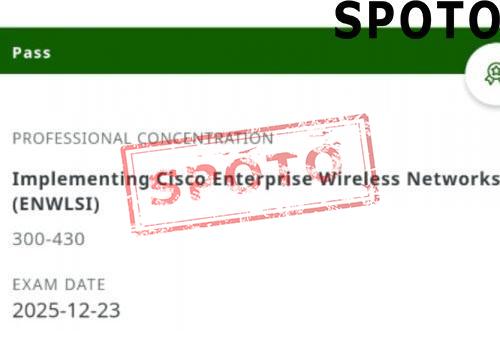
Table of Contents
In the field of network engineering, the Cisco Certified Network Professional (CCNP) is an important measure of expertise. CCNP certifications cover a wide range of specializations, such as enterprise networking, data centers, and security, with each specialization representing a different technical expertise and career path.
However, with the many CCNP certification specializations available, a natural and important question arises: which of these specializations is currently in the greatest demand in the job market? This blog will explore this question and provide guidance for networking professionals pursuing career advancement.
CCNP Certification Overview
The Cisco Certified Network Professional (CCNP) is a highly recognized credential in the field of networking technology, signifying that the holder possesses advanced skills in network design, deployment, management, and troubleshooting. The CCNP certification covers multiple specializations, each focusing on a different area of network engineering:
Enterprise
Core: The CCNP Enterprise track focuses on building and maintaining enterprise-class networks, including the design and implementation of Local Area Networks (LANs), Wide Area Networks (WANs), and Campus Networks.
Skills Required: In-depth knowledge of routing protocols (e.g., OSPF, EIGRP, and BGP), multilayer switching, virtual local area networks (VLANs), virtualization technologies (e.g., VMware and Hyper-V), and network automation and orchestration.
Data Center
Core: This track focuses on data center network architecture, including virtualization technologies, storage networking, cloud computing, and data center interconnect.
Skills Required: Proficiency in data center network design, virtualization technologies (e.g., VMware and Hyper-V), unified computing (e.g., Cisco UCS), storage networking (e.g., Fibre Channel), and network security.
Security
Core: The CCNP Security Track focuses on protecting networks from threats, including firewalls, VPNs, Intrusion Detection Systems (IDS), Intrusion Prevention Systems (IPS), and endpoint security.
Skills Required: Knowledge of network security principles, encryption, authentication, security policy design and implementation, and security incident response.
Collaboration
Core: This track focuses on unified communications and collaboration solutions such as video conferencing, voice communications, instant messaging, and collaboration tools.
Skills Required: In-depth knowledge of VoIP technologies, video conferencing solutions, instant messaging and collaboration platforms, multimedia communication services, and network quality of service (QoS).
Service Provider
Core: Focus on the design and operation of service provider networks, including IP multimedia subsystems (IMS), mobile backhaul, content delivery networks (CDN), and cloud services.
Skills Required: Knowledge of Multi-Protocol Label Switching (MPLS), Virtual Private Network Services (VPN), Voice over IP (VoIP), mobile network technologies, and service provider architectures.
Analysis of CCNP Market Demand
The demand for CCNP certifications across all specializations is influenced by a number of factors, including technological advancements, industry demands, and globalization trends such as cloud computing, mobility, Internet of Things (IoT), and cybersecurity. These trends have significantly impacted the need for CCNP-certified professionals.
For example, the popularity of cloud computing is driving increased demand in the Data Center and Enterprise specializations, while the growth of mobility and IoT is increasing the complexity and scalability requirements for Service Provider networks. Cybersecurity has always been a key area, and as cyberattacks become more sophisticated, the demand for Security specialists is on the rise.
Enterprise
The Enterprise specialization of the CCNP certification focuses on building and maintaining enterprise-class networks, a constant need in networking technology. As the need for digital transformation in enterprises continues to grow, so does the demand for people with specialized networking skills. The complexity of enterprise networks continues to increase, requiring professionals to design, implement, and maintain efficient network architectures that ensure business continuity and security.
Data Center
The CCNP certification in the Data Center specialization focuses on the design and implementation of data center networks. With the rapid development of technologies such as cloud computing, big data, and artificial intelligence, the demand for data centers has surged. According to the report released by Huajing Industry Research Institute, the global data center market size continues to expand, and the market size in China is also growing significantly, showing a huge demand for professionals in the data center specialization. In addition, data centers are moving towards a more energy-efficient and environmentally friendly direction, which requires professionals to have deep technical knowledge and understand the latest energy-saving technologies and trends.
Security
The CCNP certification in the Security specialization focuses on the implementation and management of network security. In the current context of increasing network threats, the demand for security specialists has been high. Organizations are increasingly aware of the importance of protecting critical information assets, so the demand for cybersecurity experts continues to grow. Security-oriented professionals need to be up-to-date with the latest security technologies and strategies to deal with the ever-changing cyber threats.
Collaboration
The CCNP certification in Collaboration focuses on the deployment and management of unified communications and collaboration solutions. As remote work and virtual team collaboration become more prevalent, the need for networking solutions that can support these work modes grows. Collaboration-oriented professionals need to understand how to integrate and manage a variety of communication tools to improve team efficiency and collaboration.
Service Provider
The Service Provider specialization of the CCNP certification focuses on the design and implementation of service provider networks. With the rollout of technologies such as 5G, IPTV, and fiber-to-the-home, service providers are challenged to deliver faster and more reliable services. This requires professionals to have deep knowledge of network technologies and be able to design and implement complex network architectures that support multiple services.
Which CCNP is in Demand?
When comparing the market demand for each CCNP specialization, we can analyze several key dimensions: industry trends, technology evolution, and the supply and demand of professionals. Below is a comparison of the market demand for each CCNP specialization:
Enterprise
The Enterprise specialization of the CCNP certification is traditionally a popular choice because it covers a wide range of networking technologies, including routing and switching, network security, data centers, cloud services, and collaboration. Demand for this specialization has remained relatively steady as organizations continue to rely on network infrastructure. However, since this is a mature field, growth may not be as fast as some emerging technology areas.
Data Center
The CCNP certification in the Data Center specialization focuses on network virtualization, storage networking, computing, and virtualization. According to a report released by Huajing Industry Research Institute, the global data center market size continues to expand, and the Chinese market size also grows significantly, showing a huge demand for professionals in the data center specialization. With the rapid development of cloud computing and big data, this specialization is becoming increasingly popular in the market.
Security
The CCNP certification in the Security specialization has become particularly important due to the increasing number of cyber threats. Almost every organization needs to protect its network from attacks, so the demand for cybersecurity specialists continues to grow. Professionals in this specialization are in high demand and usually have high salary levels, making it a very popular choice in the market.
Collaboration
The CCNP certification in the Collaboration specialization focuses on the design and implementation of unified communications networks. With the popularity of remote work and virtual team collaboration, the demand for networking solutions that can support these work modes is growing. While this specialization may not be as popular as the Data Center and Security specializations, it is still a growing field.
Service Provider
The CCNP certification in the Service Provider specialization focuses on the design and implementation of service provider networks. With the rollout of technologies such as 5G, IPTV, and Fiber to the Home, service providers are challenged to deliver faster, more reliable services. Demand in this specialization is likely to grow as new technologies are deployed.
Based on the above analysis, the Data Center and Security specializations appear to be the more popular choices in the market. The growth in demand in the Data Center specialization is due to the rapid growth of cloud computing and big data, while the demand in the Security specialization is due to the increasing cybersecurity threats. Both specializations are showing strong growth and high demand.
Conclusion
In a conclusion, based on an analysis of current market trends, technological evolution, and the supply and demand of professionals, it can be concluded that the Data Center and Security specializations have the strongest demand in the current market. This is closely related to the popularity of cloud computing, the growth of big data, and the increasingly serious threats to network security.
At the same time, continuous professional development is essential. In the rapidly evolving networking industry, professionals must continually update and enhance their skill sets by regularly attending industry seminars, obtaining the latest technical certifications, joining professional communities, and applying new knowledge in practice.
In a comprehensive analysis, CCNP certifications not only validate a professional's advanced skills in a specific networking area, but also serve as an important way for them to adapt to market changes and achieve career growth. Therefore, it is crucial for networking professionals to choose a certification specialization that is closely aligned with market needs and to continue their professional development.











